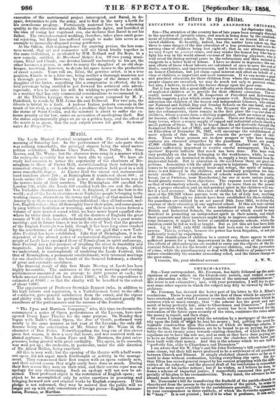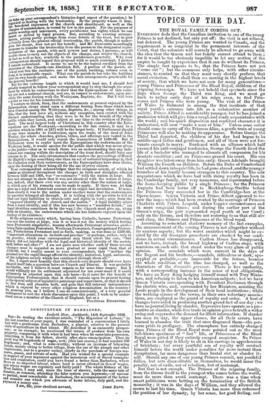CHURCH-RATES.
Sin—Your correspondent, Mr. Freeman, has fairly followed up the anti- cipations of Your article on the Church-rate notices, and rushed at one into a discussion on the "very foundation of the national establishment." His letter is not exhaustive ; and, with your permission, I will try to pre- sent some other aspects in which the subject may fitly be viewed by theLe- gislature.
Mr. Freeman has devoted the better part of his letter to Sir A. Elton's resolutions. There is one provision in the first of these which he appears to have overlooked, and which I cannot reconcile with the conclusion width be enforces with so much energy, that "the scheme has the great and rare merit of being perfectly fair, alike to Churchmen and Dissenters." I refer to the provision which, in cases where money has been borrowed for the restoration of the fabric upon security of the ratesr continues the rates until the money is repaid, and then stops.
iio
Of course F-eannot qu' el with the retention, by a mortgagee of the seeu-
rity upon the faith or he lent his money ; but, putting the most fa- violable construction n on this scheme of which its language admits, it comes to this, that the issenters are to be bound to go on paying for pro- bably the next twenty years towards existing churches, of which the Epue copahans are to have, the sole use, and as soon as they have done paying are to have no further interest or control over the churches which havejolt been built with their money. And this is the scheme which we are told is " perfectly fair, alike to Churchmen and Dissenters." I am aware that Sir W. Clay's and.Sir John Trelawny's bill contained the same clause, but their bill never professed to be a settlement of all questions between Church and'Dissent. It simply abolished church-rates as far as it could be done without confiscation, leaving everything else open. Sir Ar- thur Elton has earned general respect by his earnest grappling with the diffi- culties of the subject ; and the present draft of his resolutions is somewhat in advance of his earlier notices ; but if he wishes, as I believe he does, to frame a scheme of impartial justice, I respectfully commend this part es- pecially of his plan to his reconsideration. To my mind, the advance he has
i already made involves more.
Mr. Duneombe's bill for transferring the freehold of the parish-church or churchyard from the parson to the representatives of the parish, in order to render the same more available to the parishioners generally, "is dismissed by your correspondent in three epithets, of which the favourite appears to be " hazy." It is not printed ; but if it be what it professes, it can only, your correspondent's historico-legal aspect of the question,) be 40 take up you_ .cigorded as dealing with the trusteeship. Be the property whose it may, the beneficial enjoyment of the church and churchyard, as well as the once, is vested by law in the pariah. For the purposes of eltargell of maintenance, and interment, every parishioner has rights which he can assert "or radt‘end by legal process. But, according to existing arrange- public mow, arising partly perhaps from some details of the trust, but inn n part ortabdy from the present official trusteeship, the parish, though it under- goes the barge does not get the benefit • and Mr. Duneombe accordingly proposes to transferhe trusteeship from the parson to the designated repro-
'datives of the palish, with such powers and duties, I presume, as will :enable them to carry out the objects of the change, and render the church,
• actf as well as law, available to the parishioners generally. Why your correopondent should regard this proposal with so much contempt, I protest cannot understand. It seems to me to be the logical corollary from the rejection of the Church-rate Abolition BilL A portion of the parish, owed rent free the exclusive use of the parish building, refuses even to keep it in tenantable repair. - What can the parish do but take the building into its own hands again, and make the best arrangements practicable for the general benefit ? But for the extreme length to which it would lead me, I should feel greatly tempted to follow your correspondent step by step through the argu- ment by which he endeavours to show that the Episcopalians of this coun- try are not a national church, and are, in respect to endowments, upon pre- cisely the same footing with the Wesleyans, Baptists, &c. But I will note a point or two for his consideration:
I venture to think, then, that the endowments at present enjoyed by the Episcopalian clergy stand upon a different footing from those which have been founded among the Wesleyans, Baptists, &c. ; among other things, in this that the first have all, without any exception, been created with the distinct understanding that they were to he for the benefit of the whole public while they lasted, and subject at any time to the revision of Parlia- ment. The next largest body of Christians in this country after the Epis- copalians are the Wesleyans,—according to the last census, it may be a question whichin 1861 or 1871 will be the larger body. If Parliament should at any time transfer to Conference, upon the trusts of the deed of John Wesley, the whole churches, glebes, tithes, and offerings now vested in the Episcopalians, it would only repeat the transactions of 1520-60. But if Parliament were to confer upon the Episcopalians the endowments of the Wesleyan body, it would assume for the public that which was never given to the public—that as to which there was no und,erstanding that any indi- vidual not coming within the description of the trust deed, should have any interest in it. The only circumstance that renders the proceedings of Henry the Eighth's reign something else than an act of national brigandage is, that the Catholics took their endowments, as the Episcopalians have done theirs, upon the footing of their being all for the use of every citizen. Your correspondent acknowledges that the religious society, of which he speaks as identical throughout the changes in faith and discipline effected between 1520 and 1560, was " co-extensive " with the nation at large. He does not attempt to show that it was not identical with the nation at large, nor, indeed, that there ever was any society other than the nation at large, to which any of his remarks can be made to apply. If there was, let hint give us a legal and historical account of its origin and devolution. If none, then clearly it was to the nation under another name that the endowments in question belonged all through. It is triffiug with the question to tell us that our legal liabilities to church-rate and rights in vestry arise from the "supposed identity of the church and the nation." A legal liability arises from a legal identity, and if this has now become a "manifest fiction," (as legal identities sometimes do by the way,) the Church must give up, along with its identity, the endowments which she has hitherto enjoyed upon the footing of its existence.
If the religious society which, having been Catholic, became Protestant, was not the nation at large, was it or was it not the society which having been Protestant simplieiter, became afterwards Protestant secundum quid— being EgiseopahanProtestant, Wesleyan Protestant, Congregational Protest- ant, Presbyterian Protestant and so forth, making, as was done in 1520-60, "important alterations in its faith and practice" or perhaps, rather, only in its practice, which your correspondent may think alters the case, "but which did not interfere with the legal and historical identity of the society both before and after ?" lain not quite sure whether each of these several changes must be regarded as more gradual or more rapid than that of 1520-60, but I readily assent to your correspondent, that " neither the gradual nor the rapid:change affects the identity, historical, legal, and moral, of the religious society which has continued through them all." Sir, I regret moat heartily that this church-rate dispute should ever have shaped itself into a question between Church and Dissent. It was probably inevitable, and I believe it must remain so for some time longer. But I would willingly see its settlement adjourned for ten years more if it could ultimately be adjusted upon this sole basis—Is it more for the benefit of Episcopalian Proteatantism that it should remain upon its present footing as the special subject of legislative patronage and supervision, or that it should be free from and abandon both, and gain that full internal independence which is enjoyed by every other religious denomination in the country ? In assuring you, as I believe I can do conscientiously, of a very general willingness to rest the whole discussion upon this point, I wish to be under-
Poi srmu, DISSENTER.



























 Previous page
Previous page